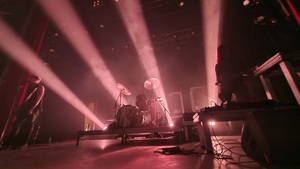Naked: Writers Uncover the Way We Live on Earth
Susan Zakin, editor
Four Walls Eight Windows
“nakedCover”
Susan Zakin, editor of Naked: Writers Uncover the Way We Live on Earth, maintains in her introduction that the primary aim of this anthology is to rescue environmental literature (never “nature writing” per se, as she takes pains to avoid negative generic connotations) from its own kind of extinction, one brought on by the cocktail of sentimentalism, dullness and hauteur often found in the writing itself coupled with the indifference of New York publishers. Therefore the writers represented here are nearly all thoroughly contemporary • no Thoreau, no Shelley, no Lewis and Clark diary entries, not even Rachel Carson. And they seldom fall victim to the flaws or obstacles mentioned above, though this doesn’t necessarily guarantee that they aren’t prone to others.
Generally, the quality of work is very good. “Audubon’s Watch,” a sampling of an eponymous novel by John Gregory Brown, is a lyrical, moody imagining of Audubon’s guilt over his encounter with the wife of the fictional anatomist, Emile Gautreaux. Sarah L. Courteau’s “Chicken 81,” which I recalled having read in Harper’s a few years ago, gives a sympathetic and unmelodramatic account of Courteau’s mother’s repulsive work on a Tyson chicken farm in West Virginia. The essay elucidates the division between the humane and inhumane. Joachim Neugroschel’s translation of Klaus Kinski’s sustained rant against Werner Herzog, in which the actor also lauds his own highly suspect resolve while filming Aguirre in the jungles of South America, is a mudslinging hoot:
“While it’s quite obvious that I’ve never met anybody in my life so dull, humourless, uptight, inhibited, mindless, depressing, boring, and swaggering,” Kinski writes, [Herzog] blithely basks in the glory of the most pointless and most uninteresting punch lines of his braggadocio.” -wm Rita Welty Bourke comes off a bit too arrogant in the opening paragraphs of “Gunnison Beach,” but this short memoir describing her time as a “park service bitch” protecting piping plovers and other endangered species on a New Jersey beach will both infuriate and entertain. The negligent family that allows their son to trample a nest of eggs makes one’s heart sink; the three adolescents who take up driftwood and crush baby birds to a blaring rap soundtrack are something else altogether.
While her rhetorical manifesto will probably never reach • least of all appeal to • the very people it seeks to change, Joy Williams’ “Ill Nature” is one of the best pieces to be featured in Naked. She writes in the second person to tear the complacency and self-interest of the average American to shreds, addressing some of the weaker arguments against the environmental movement along the way. “Ill Nature” is angry. It is frustrated. It is finger-pointing, accusatory. It is a fine piece, but it will be ignored by the many and read with delight by the few already in agreement. Maybe that will change if Oprah recommends it.
Jack Hitt’s excellent “The Island of the Damned” could very well serve as a metaphor for the impetus behind Zakin’s anthology, not to mention the whole environmental cause. Hitt’s piece concentrates on the Pacific island of Nauru, a tiny independent nation (since 1968, at least) that has, through a mix of greed, incompetence and myopia, parcelled off to phosphate miners most of its 26-mile stretch of tropical land. The ten thousand islanders now live in a ring around “Topside,” the barren, gaping central pit, and are inundated with the waste and dereliction of their spoils.
Between her anecdotal introduction and her own overly long selection “Tierra Incognita,” one gets the impression that Zakin writes about nature as an excuse to write about herself, a quality her work shares with Charles Bowden’s onanistic, self-obsessed extract from “Blue Desert,” ostensibly about the plight of Mexican immigrants. Compare these to A.L. Kennedy’s “On Bullfighting.” This digressive essay begins with the author’s attempted suicide and continues to use autobiographical touchstones; yet Kennedy never allows the focus to drift from her subject or her own cynical humor to steal the reader’s attention away from the Spanish toreros. Zakin and Bowden, on the other hand, make the mistake of thinking that whatever landscape they are discussing is interesting because they happen to be there. Bowden is additionally at odds with himself as a writer, unsure of whether or not he is a laconic, narrow-eyed tough guy or a composer of hysterically purple prose:
“The women I am seeing tell me, ‘Don’t die out there. Don’t get hurt.’ I smile and shrug. It is all false, all melodrama. I do not consider getting hurt; I do not consider not making it. That is not the threat or the attraction. I smell the aroma of the coffee and savor the bitterness on my tongue” -wm The women are melodramatic? And that passage comes just a few pages before this one:
“Something is happening at a deep level in our bodies, a revolt in the cells, a shift in the chemical juices, in the intricate synapses that fire information through our flesh and that organize our muscle into motion and purpose.” -wm It’s all very tedious and contrived, though nowhere near as tedious and contrived as Liz Jensen’s Ark Baby, a self-consciously surreal meeting between personifications of creationism and Darwinism. Then again, the problem could be that this last novelistic extract loses too much context out of its larger habitat.
The piece that most seriously undermines the intent and credibility of Naked is Ted Mooney’s “Easy to Travel to Other Planets.” At first, Mooney’s fiction seems to be a not-so-cleverly disguised educational tract about dolphins. “In shallow water, a dolphin thinks about the danger to his skin, which is twenty times more sensitive than a man’s and which dolphins feel to be the organ of dreams, though they do not sleep,” is just one example, another being, “Peter [the dolphin] regarded her appraisingly. It is an attribute of the dolphin’s eye that it is clear-sighted in both air and water.” Left at this, it would simply be bad writing and nothing more. But things worsen exponentially in a matter of a few pages:
“When the dolphin’s cock appeared, emerging erect from the slit on his underside, Melissa stepped away from his jaws and pulled the leotard past the long red scratches [made by the animal’s teeth] and off her legs. Peter saw the hair. She moved toward him unc! ertainly, drawing the fingers of one slow hand upward through her cunt. She is very wet, and as she repeats the gesture her knees begin to quiver•. She says: ‘Love?’ And her legs buckle under her.” -wm At the end of several more paragraphs of the same, Mooney closes by stating the obvious in euphemistic terms: “They were making love in the shallow water.” You don’t say? The blurb at the back says that this scene from Mooney’s 1981 novel “caught the attention of readers and reviewers,” although it doesn’t explain their precise reactions. My guess is one of disgust mingled with incredulity. John Irving handled the subject of bestiality with careful skill in The Cider House Rules; Woody Allen with humor in Everything You Wanted to Know about Sex*; Edward Albee with satire in The Goat: or Who is Sylvia?; e.e. cummings with literate wit in The way to hump a cow is not…. Mooney’s passage is neither erotic, challenging, literate, witty nor “hallucinatory,” as the blurb also insists; it is just done in poor taste and even worse style.
Zakin’s club is not an exclusive one, but membership favors the Americans or a foreigner with an American tie-in. After reading Naked, one walks away with the impression that sub-Saharan Africa, the American southwest and the vanishing Florida Everglades are nature’s last outposts in the world, and that everything else is either too despoiled or too pristine to merit attention. Australia, Europe, Asia and the two terrestrial poles apparently have nothing to offer. Chances are that it wouldn’t have been difficult to find a foreign writer discussing Gorleben and nuclear waste, Russia and the Chernobyl aftermath, China and the Three Gorges Dam, or one of the thousands of environmental hotspots around the globe. Naked might also have been improved by an excerpt from Bill Bryson’s Down Under, to name but one example, or to have forgone the extremely short and unremarkable piece by Bruce Chatwin, who died in 1989, for one by a living British nature writer such as Jim Perrin or Roger Deakin.
In spite of these drawbacks, and in spite of its rather empty subtitle (don’t all writers “uncover the way we live on Earth” in one form or another?), Naked should ultimately fulfill its purpose. There are about ten authors whose work here ought to draw readers to more of their writing. The misunderstood genre of nature writing as a whole will benefit from them, as well as the anthology’s more mediocre talents who attend worthwhile topics.
And before someone points out the major paradox inherent in this endeavor, yes, every page of the book is printed on “100% old-growth-forest free, recycled paper.”
[www.fourwallseightwindows.com/bookzakin1.html](http://www.fourwallseightwindows.com/bookzakin1.html)












